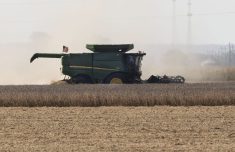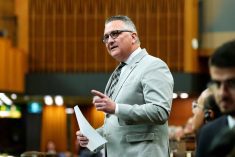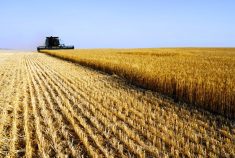Anybody who wants to blame farmers for polluting Lake Winnipeg with fertilizer and manure runoff had their chance to speak up at a recent Winnipeg conference called Keeping Water On The Land.
But no one stepped forward. Indeed, Manitoba’s environment minister took pains to compliment farmers in his speech and in an interview.
“I have seen tremendous leadership and involvement, whether it’s Manitoba Pork, the feed producers, Keystone Agricultural Producers, they’re examples country-wide now. They take their responsibilities seriously,” Gord Mackintosh said in an interview.
Read Also

Alberta harvest wrapping up: report
Harvest operations advanced to 96 per cent complete in Alberta as of Oct. 7, with only a few late-seeded cereal and canola fields remaining, according to the latest provincial crop report.
Mackintosh spent more time talking about the importance of controlling Winnipeg’s waste-water phosphorus emissions than he did targeting farmers.
“It is absolutely critical that farmers know that urban waste water is recognized as a serious threat and that action is being taken and huge investments are being made,” he said.
Many Manitoba farmers are hypersensitive about allegations that farms are a significant source of the phosphorus overloading that is choking large parts of Lake Winnipeg.
The issue has had massive implications for some farming industries, such as hog production.
A Red River Valley moratorium on new hog barn construction was imposed based on the claim that too much phosphorus in manure could be a significant cause of the lake’s problems. That moratorium was extended province-wide in the Save Lake Winnipeg Act that was announced on the eve of the last provincial election.
While the issue has most directly affected the hog industry, grain farmers have also been worried because fertilizer for grain production employs more phosphorus than is present in hog manure.
However, there was little hostility toward farmers or a portrayal of farmers in a negative light at the conference, which was focused on finding ways to keep more water on farmland and keep it from running off rapidly after rainfall or spring melts.
Farmers were often represented as being examples of emission reduction.
A study presented at the conference found that today’s farmers are highly efficient in their rates and methods of fertilizer application and that the main agricultural contribution to phosphorus runoff comes from phosphorus applied in previous decades.

















